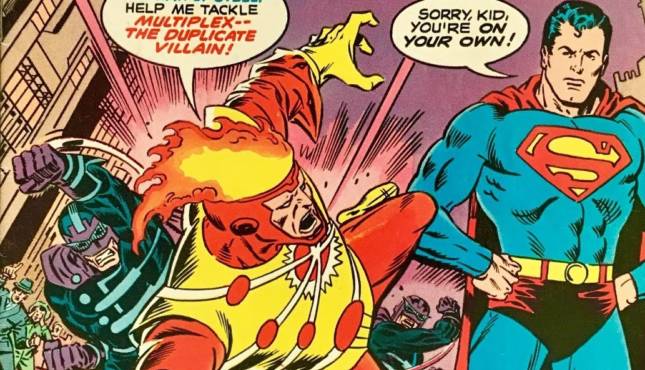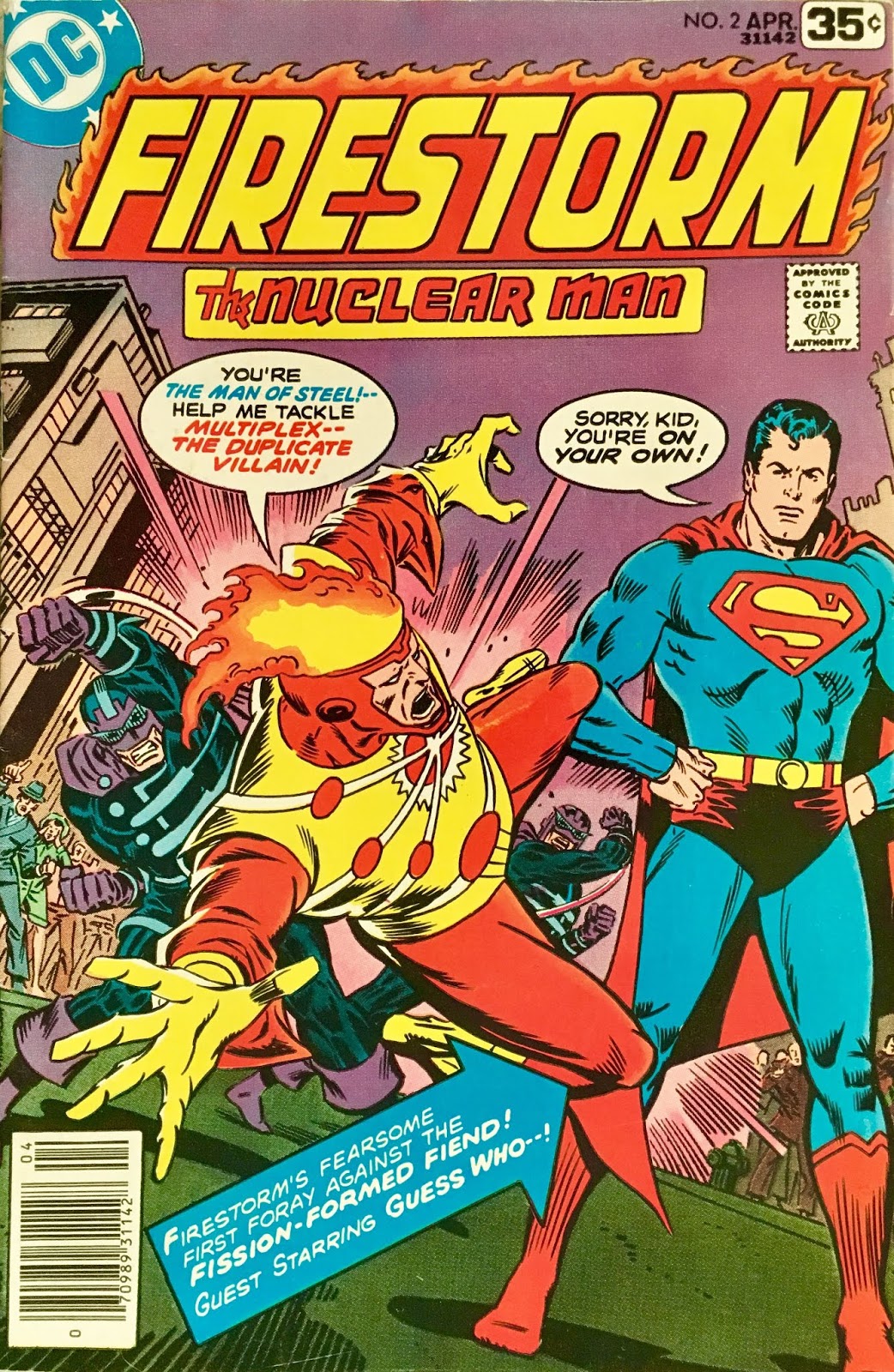Movies & TV / Columns
Off The Rack Comic Review: Firestorm
 Firestorm
Firestorm
I don’t tend to review a lot of older books for this column, I know.
It’s not entirely a conscious choice. Historically, when I have reviewed books from before, say, the 1990’s, they don’t typically get the attention that books from that era onward do.
And I am a man of the people! Folks tend to want to read comics from the timeframe in which they came of age. And most comics fans nowadays were born in the 80’s and 90’s, so they grew up with that generation.
Still… I do try my best to be all-encompassing, so I’ll pull out an older book now and then in the sake of fairness. I am a kind and benevolent come reviewer. With that in mind, let’s find some good 70’s era crazy, all right?

TITLE: Firestorm: The Nuclear Man
Writer and Artist: Gerry Conway and Al Milgrom
Publisher: DC
Protagonists: Firestorm
Antagonists: Hyena, Multiplex, Killer Frost
Firestorm is the origin story and ongoing adventures of The Nuclear Man, a hero created from a nuclear explosion that bonded teenage star athlete Ronnie Raymond with scientist Martin Stein. The explosion did more than combine them, though; it also gave them fantastic powers. While bonded, the two can convert the molecular structure of inanimate objects (to change, say, a taxi cab into water), fire energy blasts, and fly. While they are not bonded, neither Ronnie nor Martin has any abilities, and they retain their normal appearances.
Separately, Ronnie is the real protagonist of the series. Martin Stein is just kind of in the background until Ronnie decides to merge. Dr. Stein is aware of everything during Firestorm time and can communicate to Ronnie, but once they split, he has no idea what happened and is missing time. After being attacked by a spurned Killer Frost in an Arctic lab, Stein wakes back up in the States and just assumed he… walked back? I mean, okay. He has a lot of faith in himself. But he even eventually hires a P.I. to track him because he wants to know what the heck is going on.
Ronnie is a transfer student whose dad moves around a lot for newspaper jobs, but the first few issues hint to there being more than meets the eye here. Ronnie is a great athlete and an okay student—he refers to himself as a B- average—and in a hilarious turn on convention, finds himself being bullied by the star pupil of his new school, Clifford Carmichael. Yeah, Gerry Conway, I’m not exactly feeling the sympathy for the two-sport star who gets B’s in the face of a nerd. Good change-up on the Spider-Man cliche, though!
In these first few issues, Firestorm fights some crime and builds up a rogues gallery of Killer Frost and some D-list villains such as Multiplex and Hyena. Ronnie wants to be a hero—he even gets an “Atta boy!” from Superman—but he goes through the typical new hero growing pains as he does so.

There is some real Stan Lee naming conventions going on in his book. Ronnie Raymond. Doreen Day. Clifford Carmichael. Eddie Earhart. Gerry Conway loved alliterative names, man. Or, at least, since he was cribbing from Stan and Steve’s notes, he is giving them a shout-out.
During this introductory set of issues, Ronnie starts a romance with Doreen Day, and if I didn’t know he was the hero of the series, I’d be begging her to stay away from this kid. He erupts with threats of violence against other students at the smallest provocation, knocks food over onto her, flakes out, and ignores her. From the outside, this has all the earmarks of a textbook abusive relationship.
Man, I am really reading too many advice columns lately.
The problem I tend to have books from the Silver and Bronze Age carries over here as WOW, there are so many words on almost every single page. Setting aside the very basic storytelling. Ignoring the clunky, archaic dialogue. Each page feels like it has fifteen narrative blocks, eighteen word balloons, and ten thought bubbles. It’s like Conway is in absolute love with the written word and can’t bear to be without it. Pages just seem to drone on and on with narrative blocks telling us what the art should be showing and thought bubbles making sure we aren’t left to interpret anyone’s motivations.
It’s really unwieldy. But then, so is the dialogue. It’s not abhorrent by any stretch, but again, it is a lot of characters just explaining everything in full detail even when that isn’t required at all. That’s my problem with pre-Modern Age books: let the art do its job, guys!
Aside from that, there is something to be said for the old single issue comic book tales that got in and out in twenty pages and didn’t need a six issue saga to tell every story. I can see the positives to both sides. Long arcs allow the story to get more into the “why’s” and “how’s” without taking shortcuts; short stories give you more bang for your buck and can allow the rarer extended arcs to have more importance.
The first five issues of Firestorm are five more-or-less self-contained tales with subplots stringing through to connect it all. Firestorm bounces from baddie to baddie as he builds his own legacy as a burgeoning hero.
Talking Point: So that brings us to the question of the week: Do you prefer virtually every comic story be a multi-issue tale that builds to a final conclusion? Or do you prefer quick-hitting adventures?
And while you’re thinking on that, if you want to enjoy more comic book related blogs and a weekly podcast, visit Ghosts of the Stratosphere. Our podcast is full of debates, top ten lists, and comic reviews, and we update daily!
You can also follow us on Twitter, @gotstratosphere for updates!








